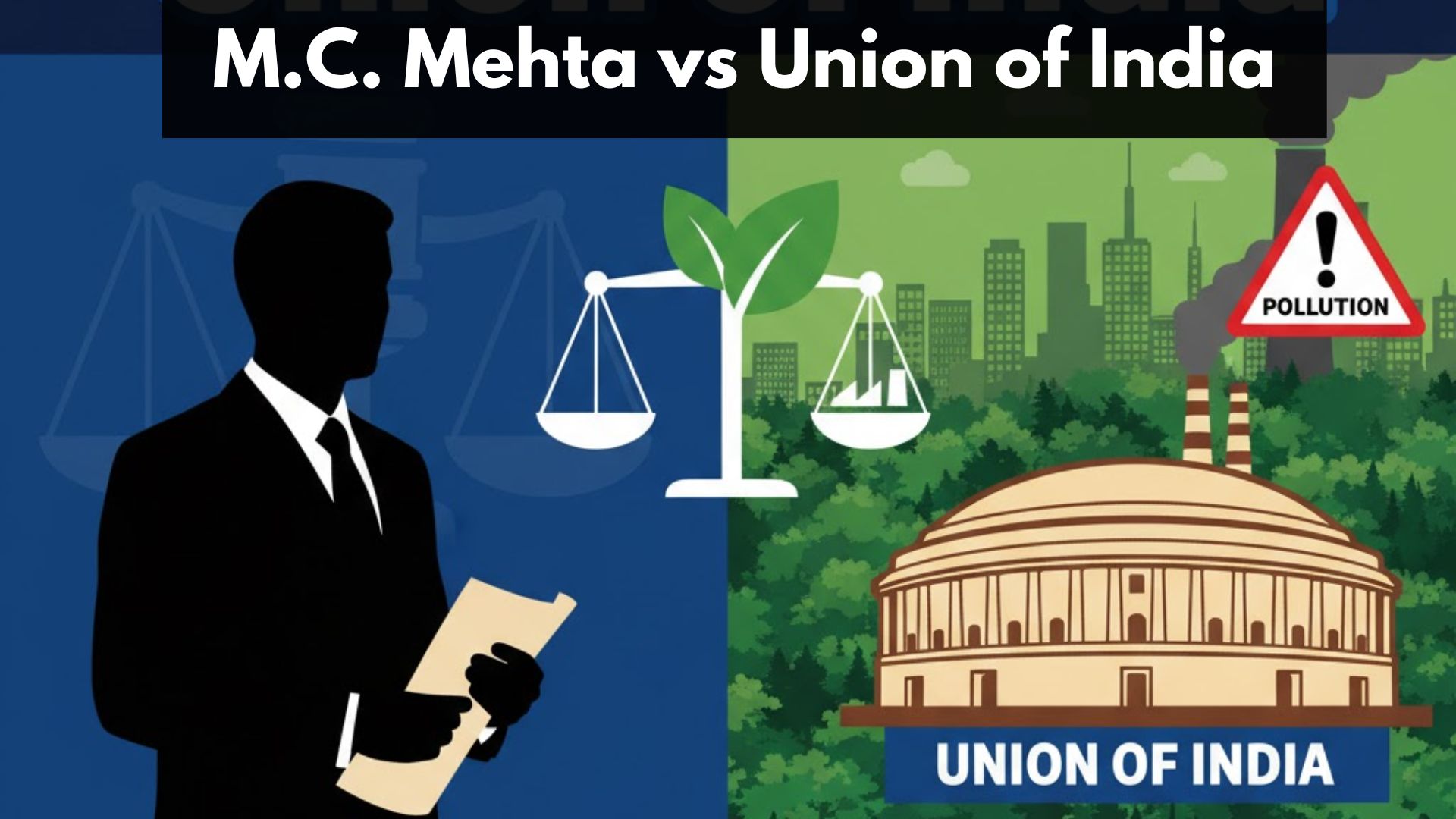
Case Summary: M.C. Mehta vs Union of India and Others
**Case Name:** M.C. Mehta vs Union of India and Others
**Court:** Supreme Court of India
**Case No.:** Writ Petition No. 3727 of 1985
**Date of Decision:** 22-09-1987
**Bench:** Division Bench - K. N. Singh, J; E. S. Venkataramiah, J
[Judgment Source]
https://www.courtkutchehry.com/Judgement/Search/AdvancedV2?docid=272651
**Advocates:** Party in person; B. Datta; R.A. Gunta; S. K. Dholakia; Miss Bina Gupta; B.P. Singh; S.R. Srivastava; Krishan Kumar; Vineet Kumar; R. Mohan; Mrs. Shobha Dixit; A. Sharan; D. Goburdhan; Mrs. G.S. Mishra; Paraieet Sinha; R.C. Verma; R.P. Singh; Ranjit Kumar; B.R.L. Iyengar
**Final Decision:** Disposed Of
All Citations
AIR 1988 SC 1037; (1987) 3 CompLJ 69; (1987) 3 JT 630; (1987) 2 SCALE 611; (1987) 4 SCC 463; (1988) 1 SCR 279; (1988) 1 UJ 75
Facts of the Case
The petitioner, M.C. Mehta, a social worker, filed a public interest litigation seeking a mandamus to restrain industries and municipal bodies along the Ganga from discharging untreated trade effluents and sewage into the river. The petition highlighted the severe pollution in the Ganga caused by industrial waste and municipal sewage, posing a threat to the environment, public health, and the river’s sanctity.
Law Points Raised
1. Obligation of the State under Article 48A to protect and improve the environment.
2. Fundamental duty under Article 51A to protect and improve natural environment.
3. Powers under the Environment (Protection) Act, 1986 to control and prevent water pollution.
4. Liability of industries under the Water (Prevention and Control of Pollution) Act, 1974.
5. Public interest litigation as a tool for environmental protection.
Acts / Provisions / Articles Referred
• Constitution of India, 1950 — Article 48A, Article 51A, Article 252
• Environment (Protection) Act, 1986 — Sections 2, 3, 5, 9, 15
• Water (Prevention and Control of Pollution) Act, 1974 — Sections 2(j), 5, 7, 16, 24
• Civil Procedure Code, 1908 — Order 1 Rule 8
Judgements Referred
Reference to Stockholm Conference Proclamation (1972) and principles from Lal's Commentaries on Water and Air Pollution Laws.
Obiter Dicta
The judgment emphasized the historical and cultural significance of the Ganga and the urgent need to prevent environmental degradation. It reiterated that environmental protection is both a constitutional duty and an international obligation under principles recognized in global environmental conferences.
Ratio Decidendi
Industries and municipal bodies have a legal obligation to prevent pollution by installing appropriate treatment plants before discharging effluents. The State has a constitutional mandate to ensure environmental protection and public health.
Final Ruling
The Court issued directions for phased compliance by industries and municipal bodies to set up treatment plants, failing which closure orders could be issued. The matter was to be monitored periodically.
Relevant Paragraph Numbers
Paras 2, 3, 4 — Environmental importance; Paras on Articles 48A & 51A; Stockholm Conference principles.
Summary
This landmark PIL established the judiciary’s proactive role in environmental protection. It reinforced constitutional and statutory duties to prevent water pollution, setting a precedent for future environmental jurisprudence in India.
[Judgment Source]
https://www.courtkutchehry.com/Judgement/Search/AdvancedV2?docid=272651